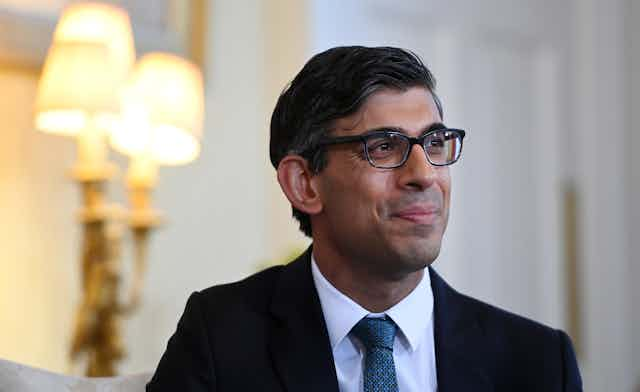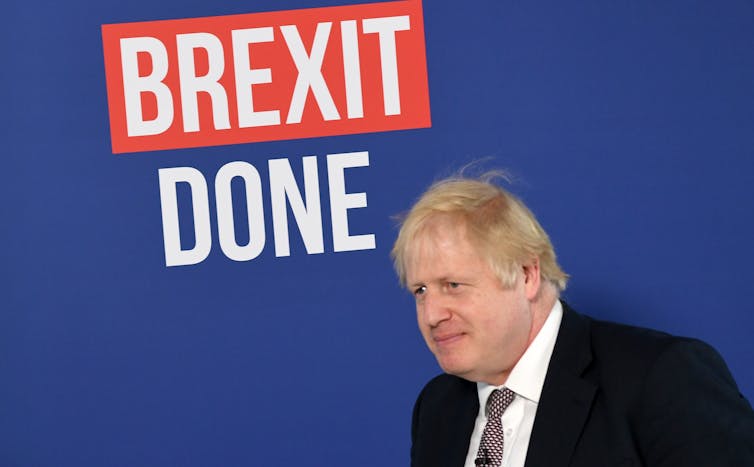
Long-running talks between the UK government and the EU over Northern Ireland may be coming to an end. Prime Minister Rishi Sunak recently travelled to Belfast in hope of reaching a deal to ensure smoother trade between Northern Ireland and its British and European neighbours.
But a deal has yet to be announced. And Sunak’s plans could yet be disrupted by Tory backbenchers, who are sceptical of any arrangement that could be seen as a concession to the EU.
The details of the deal remain private, but the general outline is known, including simplified border checks on goods entering Northern Ireland from the UK and a clearer delineation of the role of the EU’s court of justice.
The latter is a key source of disquiet among some MPs. The protocol, which sets out how trade happens between Northern Ireland, Great Britain and Europe, gives the court jurisdiction over trade disputes in Northern Ireland.
Last year, the UK government proposed removing this power through the Northern Ireland protocol bill. This controversial piece of legislation would mean the UK unilaterally rewriting the protocol. This would violate the UK’s obligations under international law, but it has significant support on Tory backbenches.
We might start by asking how much of this opposition is about substantive policy and how much is about optics. For example, many Tory MPs only expressed fundamental concerns with the detailed provisions of the 2020 withdrawal agreement that contains the protocol after they had agreed to it, suggesting that detailed work had not kept pace with rhetoric.
Rather than review the withdrawal agreement here, we can simply note that the new deal is being made within the confines of the existing text, not a renegotiation of the protocol. If an MP was ill-disposed towards the protocol before now, they might assume that the deal is more of the same.
Former prime minister Boris Johnson sold the agreement (and protocol) as an “oven-ready deal” at the 2019 general election. Just a few years later, he was pushing to unilaterally disapply much of the protocol through the Northern Ireland protocol bill. And now, he is making known from the sidelines that he is opposed to Sunak’s plans to abandon the bill in favour of a new deal.
Sunak’s deal therefore looks like something of a concession to the EU, which backbenchers might consider a poor return, especially with Johnson talking up how he could get a much better result.

Facundo Arrizabalaga / EPA-EFE
The Democratic Unionist Party (DUP) in Northern Ireland provides useful cover here for those MPs. The DUP is also ambivalent about a deal, and has set out a series of seven “tests” that any proposal must meet.
Key to the current tensions is the DUP’s refusal to allow the formation of a Northern Ireland government while the protocol is in effect. If they will not bend on this, then there is little point in heading down the road of tweaking a treaty that the DUP want denounced in full.
The notion that the only safe way to pursue Brexit is to break off all relations with the EU has traction in some parts of the party, making even the smallest concession intolerable.
Trouble at Number 10
Sunak himself has also contributed to this rebellion. His premiership to date has been marked by a distinct unwillingness to take on the different factions in his party. Indeed, this protocol deal is the only example of where he has taken some initiative on policy.
His efforts to keep everyone on board might have righted the ship after Truss’ brief time in Number 10. But it has also made it very easy for his MPs to push back on any policy point they dislike, let alone one of the most high-profile policy platforms of the party.
And lurking in the background is the coming general election. Labour’s strong polling suggests that another change of Tory leadership is on the horizon, so some backbenchers might be thinking ahead.
For Conservative MPs, loudly proclaiming their Brexit credentials is now a rather mainstream position, especially with the departure of many (EU) moderate MPs in the run-up to the 2019 general election. If Labour decides to seek more agreements with the EU, then having set out one’s stall now on the matter is an understandable move.
Of course, there is an irony that despite all this unhappiness, MPs do not need to be given a vote in the Commons about this deal: it can be simply approved by the withdrawal agreement’s internal management structures.
If Tory MPs do want to follow through on this, then they are going to have to take much more decisive action, such as getting ministerial resignations or forcing a fourth leadership contest within a year. Whether either side has the appetite to push it that far is unclear.
Post a Comment